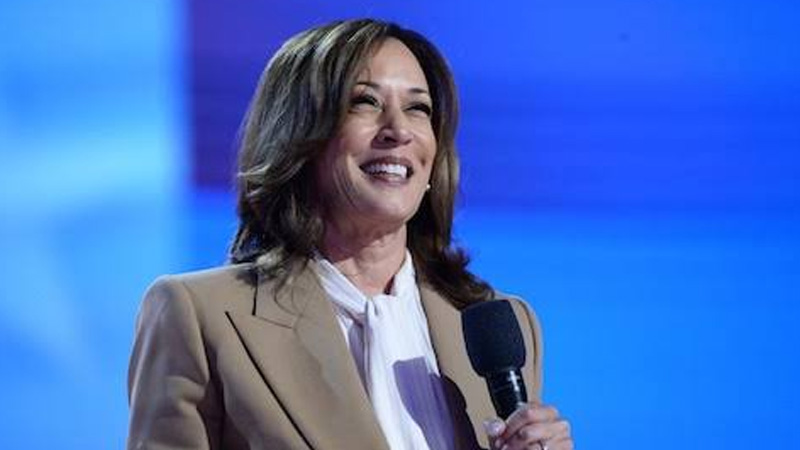Harris’s Path to the White House Crumbles As New Polling Data Reveals the Truth About Trump’s Surge

Photo Credit: AP/John Raoux, File
Vice President Kamala Harris’s once-promising journey to the White House appears to be faltering as fresh polling data unveils unexpected shifts in voter sentiment, signaling a remarkable resurgence for former President Donald Trump. The latest surveys paint a picture of a rapidly evolving political landscape, where Harris’s initial momentum has given way to a startling surge in support for her Republican rival.
According to a report by Newsweek on Saturday, August 24, 2024, the most recent polls conducted by reputable organizations such as Betfair, The New York Times/Siena College, and FiveThirtyEight have sent shockwaves through the Democratic camp. What was once considered a comfortable lead for Harris has now dwindled to a razor-thin margin, with some polls even showing Trump pulling ahead in key battleground states.
One of the most striking revelations comes from Betfair, a UK-based bookmaker known for its accurate political predictions. As of Saturday morning, Betfair gave both Harris and Trump an equal 49% chance of winning the November election. This marks a significant shift from just days earlier when Harris held a slight edge.
The dramatic change in odds coincides with a major announcement from independent candidate Robert F. Kennedy Jr. On Friday evening, Kennedy made what he called a “heart-wrenching decision” to suspend his 2024 White House bid. In a surprising move, he urged his supporters in battleground states to back Trump instead, potentially altering the electoral calculus in crucial swing states.
Thomas Gift, an expert on U.S. politics at University College London, offered insight into Harris’s predicament. “Harris has been basking in adulation and positive media coverage for weeks. But her honeymoon will end. Honeymoons always do,” Gift remarked. He went on to explain that as Harris is forced to provide more specific policy details, voters may be reminded of her reputation as one of the most liberal senators in Congress.
The shifting dynamics of the race are particularly evident in key demographic groups. A recent poll by Outward Intelligence found that if Kennedy were to exit the race completely, 59% of his supporters would likely vote for Trump, compared to only 41% for Harris. This potential influx of Kennedy supporters could prove decisive in closely contested states.
Trump’s campaign strategy appears to be evolving as well. Gift predicts that the former president will hone his attacks on Harris, saying, “Expect to hear the phrase ‘San Francisco liberal’ over and over and over.” This line of attack seeks to paint Harris as out of touch with mainstream American values, a tactic that has proven effective in previous elections.
While Harris still maintains an edge in some national polls, her lead has narrowed considerably. The FiveThirtyEight polling average, which combines multiple surveys, showed Harris leading Trump by just 3.7 percentage points on Friday. This represents a significant tightening of the race compared to earlier projections.
Economic issues continue to play a central role in shaping voter preferences. Despite recent positive economic indicators, including robust growth and a drop in inflation, many Americans remain concerned about the cost of living. Trump has sought to capitalize on these anxieties, positioning himself as better equipped to manage the economy.
A recent poll conducted for the Financial Times and the University of Michigan Ross School of Business revealed that Harris holds only a slight advantage over Trump regarding whom Americans trust to manage the economy. This narrow gap underscores the challenges Harris faces in convincing voters of her economic credentials.
The role of third-party candidates remains a wild card in the election. While Kennedy has suspended his campaign, other alternatives like the Green Party or Libertarian Party nominees could still impact the final outcome in close states. The fragmentation of the electorate adds another layer of uncertainty to an already volatile race.
Foreign policy challenges are also likely to play a significant role as the election approaches. The ongoing war in Ukraine, tensions with China, and conflicts in the Middle East will test both candidates’ leadership credentials and vision for America’s role in the world.
As the campaign intensifies, voters can expect to see more direct clashes between Harris and Trump through debates, advertising, and campaign events. Both candidates will work to energize their bases while also trying to win over undecided voters in key swing states.
With just over two months until Election Day, the 2024 presidential race remains highly competitive and unpredictable. Harris and Trump present starkly different visions for America’s future, and voters will have a clear choice to make. As Gift noted, “a lot can change between now and November 5.”





